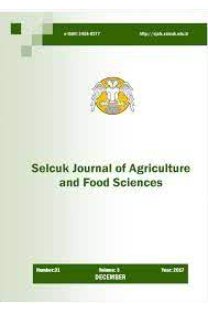Effects of Colchicine Treatments on Some Grape Rootstock and Grape Varieties at Cotyledon Stage
Effects of Colchicine Treatments on Some Grape Rootstock and Grape Varieties at Cotyledon Stage
Grapevine, Seedlings, Chemical mutation, Polioloidy, Aneuploidy,
- ISSN: 2458-8377
- Yayın Aralığı: Yılda 3 Sayı
- Başlangıç: 2002
Effectiveness of Grape (Vitis Vinifera L.) Seed Extracts on Fungi and Bacteria Management
Zeki KARA, Mahmut BAYKAN, Metin DOĞAN, Didem EGE
Ribozom İnaktive Eden Proteinlerin Bitki Virüs Hastalıklarının Kontrolünde Kullanılma Olanakları
Nihan GÜNEŞ, Hikmet Murat SİPAHİOĞLU, Mustafa GÜMÜŞ
Mikoriza ve BBAR Uygulamalarının Çilekte Büyüme Üzerine Etkileri
Wind Erosion Risk in Agricultural Soils under Different Tillage Systems in the Middle Anatolia
Kazım ÇARMAN, Kazım GÜR, Tamer MARAKOĞLU
Tekirdağ İli Şarköy İlçesi Bağcılık Yapısının İncelenmesi
İlknur KORKUTAL, Elman BAHAR, Arzu ZİNNİ
Bahar AYDIN CAN, Sait ENGİNDENİZ
Ali KARAGÜLMEZ, Mustafa KONAK, Osman ÖZBEK
Comparison of Strip Tillage Systems for Sillage Maize Production in Middle Anatolia
Kazım ÇARMAN, Ergün ÇITIL, Tamer MARAKOĞLU, Kazım GÜR, Hasan KIRILMAZ
